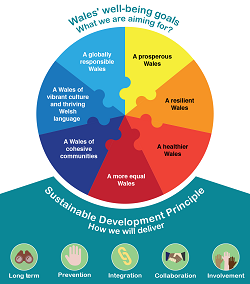Case study: Turning Welsh legislation for sustainable development into everyday practice

Source: adapted with permission of Public Health Wales
Sustainability has been a long-standing priority for Wales, United Kingdom, and the decision to legislate for it has both political and historical foundations. Following a period of implementation of the Wellbeing of Future Generations Act 2015 (WFG Act), the findings of a newly published report can enable Wales to respond more fully to the global challenges of sustainable development.
Wales is one of the four devolved administrations of the United Kingdom, which have law-making powers. An increasing awareness of both the social determinants of health and the global challenges related to them led Wales to legislating for sustainability through the WFG Act. Its implementation process mirrors that of the United Nations Sustainable Development Goals.
The WFG Act renders national and local public services legally responsible for maximizing their contributions to improving the economic, social, environmental and cultural well-being of Wales, regardless of their specific responsibilities. Organizations must demonstrate how they are contributing to Wales’ 7 statutory well-being goals and to executing their responsibilities in line with the Sustainable Development Principle (SD Principle) and 5 ways of working that are embodied in the WFG Act.
What is happening?
Reporting requirements are in place. For example, the “Future trends report” (2017) lists the major challenges to be addressed in Wales, and the annually published report, “Well-being of Wales”, assesses progress towards the 46 indicators.
The Future Generations Commissioner for Wales has the unique role of advocating and supporting action towards sustainable development. She has recommended that holistic measures addressing the climate emergency be prioritized and scaled up through investment in sustainable transport, low-carbon homes and buildings, renewable energy and nature-based solutions.
The Auditor General for Wales has begun to examine the ways in which organizations are making changes towards applying the Wales SD Principle and the 5 ways of working, and how they are working to involve citizens and stakeholders in delivering well-being. Both the Future Generations Commissioner and the Auditor General have reflected that changing the ways in which public bodies work, including their communication with and involvement of the public, still presents a challenge. Tools and techniques are required to help staff and organizations explore the relevance of the SD Principle and apply it in daily practice. Increased capacity and a change in mindset are also fundamental to creating the necessary cultural shift.
The literature review, Implementing the Sustainable Development Principle (2019), published by the Health and Sustainability Hub, Public Health Wales and Kingston University, London, identifies approaches and methods, support materials and examples that can facilitate the implementation of sustainable development. Five recommendations are seen as essential to securing and sustaining change. These relate to long-term thinking, taking a holistic approach to prevention, interdepartmental/intersectoral collaboration, partnership building and community involvement. The literature review also provides favourable comparisons between the Welsh legal frameworks and those of other countries that have been used to affect change. It indicates that the Welsh approach could have a significant and lasting positive effect on the lives of people in Wales, and potentially set an example globally.
In addition to serving the Welsh context, the review has global relevance: it can be used as a go-to document in countries and regions seeking to implement the Sustainable Development Goals. The review also demonstrates how Wales, as the only country in the world to legislate for the needs of future generations, is leading the way towards embedding sustainable development in all aspects of government policy, and in regional and local action.
With only a matter of years left to safeguard future generations and the planet, Wales is translating sustainable development into practice. New findings are providing the stimulus needed to respond to a rapidly changing political, social, economic and cultural climate at a potentially defining period in human history.



